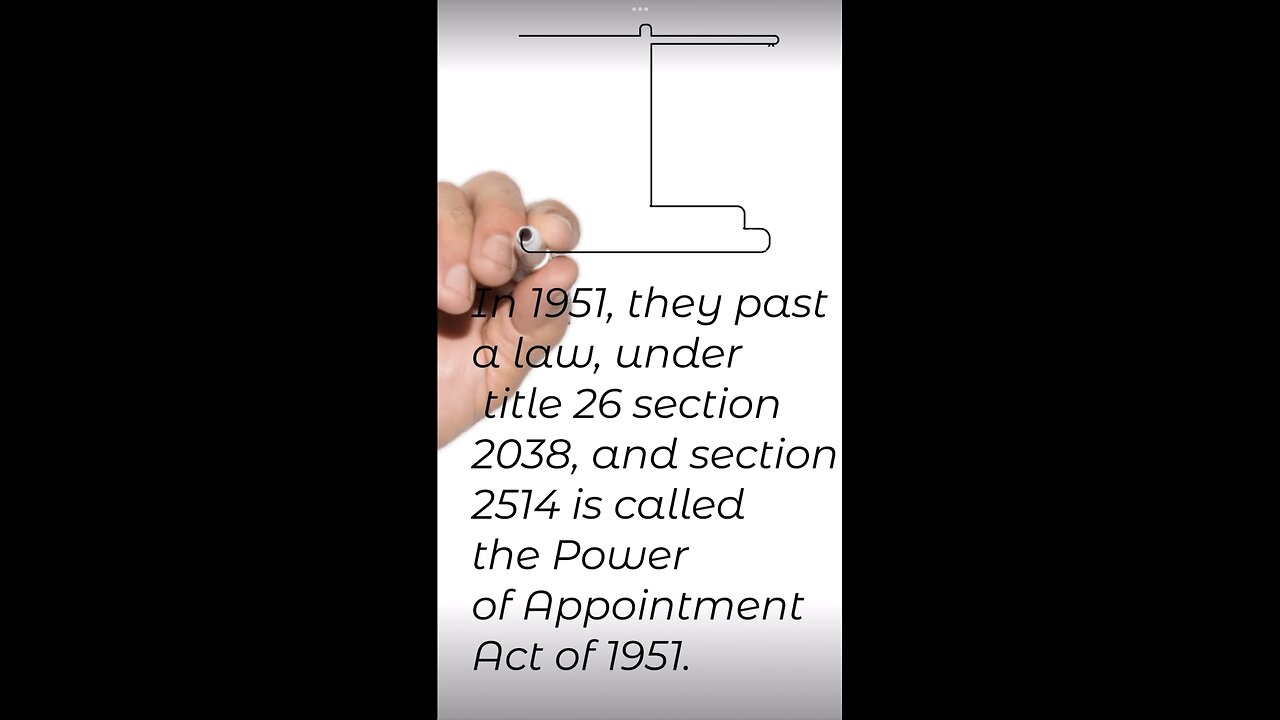Premium Only Content

The Power of Appointment Act 1951!
#Knowledgemakesmenunfit2beAslave
Appointment, Power of
A power that is conferred upon a donee to dispose of the donor's property by nominating and selecting one or more third-parties to receive it. The property may consist of tangible items like cars, boats, and household items, or it may consist of an intangible interest in property, such as the right to receive dividend income from stocks.
A power of appointment may be transferred only in writing, such as by deed, trust, or will. Donees who receive an oral promise to be given a power of appointment, however, may bring an action for Promissory Estoppel if they have relied to their detriment on that promise. In no case will a court find that a power of appointment had been created unless the donor's intent to create the power is demonstrated; the person who would hold the power is indicated; the circumstances under which the power could be exercised are identified; and the property that is subject to the power is specified.
No particular semantic formula is necessary for the creation of a power of appointment. Any written expression, however informal, will suffice so long as it clearly indicates an intention to create such a power. Thus, a power of appointment may be created by implication. For example, a devise or bequest of property to a person as he or she may designate to receive it or subsequently transfer it gives that person a power of appointment. A testamentary gift to a donee for life, to be at his or her disposal, or with a right to dispose of it at the donor's death, confers a power of appointment. For example, if a donor gives the donee an automobile to use as the donee sees fit during the donee's lifetime, the donor has given the donee a power of appointment over the automobile. Similarly, if a donor gives the donee authority to dispose of the automobile upon the donor's death, the donor has given the donee a power of appointment over the automobile.
There are three classes of powers of appointment. General powers of appointment give donees the power to dispose of the property in any way they see fit. Limited powers of appointment, also known as special powers of appointment, give donees the power to transfer the property to a specified class of persons identified in the instrument creating the power. Testamentary powers of appointment are powers of appointment that typically are created by wills.
-the right to leave property by will, transfer, gift or distribution under a trust. Such a power is often found in a trust in which each of the trustors (the creators of the trust, usually a husband and wife) is empowered to write a will leaving his or her share (or some part) to someone. If the power of appointment is not used then it expires on the death of the person with the power
-power of appointment in property law, authority to appoint persons either from a particular class ‘special power’ or selected by the donee of the power ‘general power’ to take an estate or interest in property.
-
 UPCOMING
UPCOMING
Tundra Tactical
1 hour agoATF Violates Court Order to ATTACK Americans.
35 -
 UPCOMING
UPCOMING
Common Threads
1 hour agoLIVE DEBATE: Will Mainstream Media Survive a 2nd Trump Term?
7 -
 UPCOMING
UPCOMING
Quite Frankly
5 hours ago"Biden's Farewell, Dreams For Sale, Spy Hunting, and Open Lines" 1/16/25
1.3K -
 UPCOMING
UPCOMING
Sarah Westall
45 minutes agoCalifornia puts Children 2nd to Big Pharma Profits, Chemically Castrating Boy w/out Dad’s Consent
27 -
 UPCOMING
UPCOMING
theDaily302
10 hours agoThe Daily 302- Craig "Sawman" Sawyer
273 -
 11:45
11:45
Reforge Gaming
9 hours agoHalo on PS5 - Nothing is Sacred
4.31K1 -
 52:05
52:05
PMG
19 hours ago $0.15 earnedWhat "Does Freedom Cost? Steven Soloman's On-the-Ground Documentary in Ukraine"
4.93K -
 1:03:43
1:03:43
In The Litter Box w/ Jewels & Catturd
1 day agoFlaming Crack Doodles | In the Litter Box w/ Jewels & Catturd – Ep. 721 – 1/16/2025
63.8K28 -
 1:06:42
1:06:42
Dr. Drew
6 hours agoDave Rubin: Wildfires Burn Los Angeles & CA Gov. Newsom's Last Hope Of Being President – Ask Dr. Drew
56.7K2 -
 2:08:01
2:08:01
The Quartering
7 hours agoElon Musk Has A MELTDOWN & Leaks DM's, Matt Walsh Vs OF Girls, & the WORST Video We've Ever Seen!
128K61